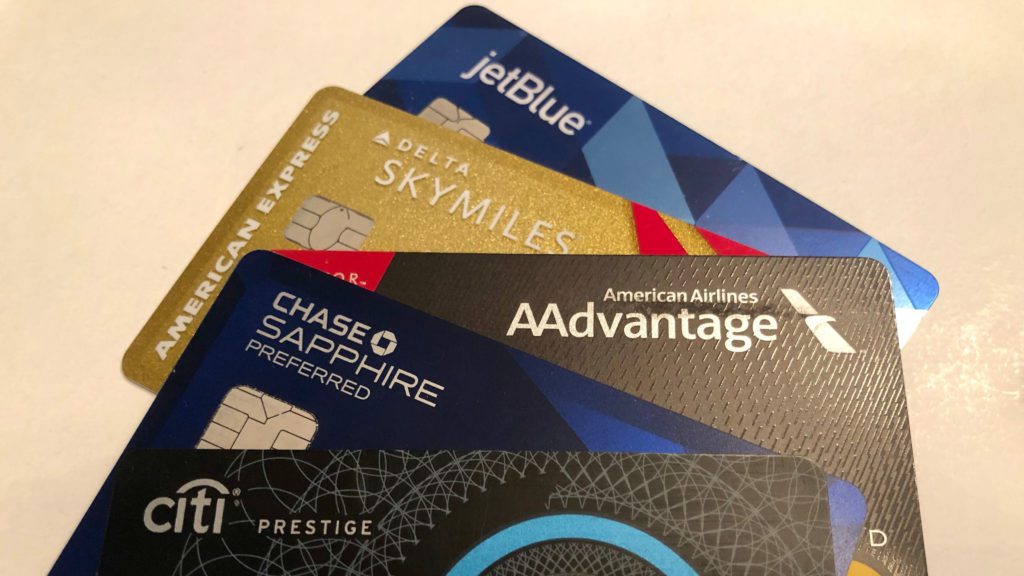All of the larger airlines in the U.S. offer co-brand credit cards. They provide extra benefits to cardholders, from ones with no annual fees to premium cards costing up to $695 annually. While you’d think using a co-branded card would be the best choice for earning points with your flight purchase, that’s not always the case. Many times, you don’t earn any extra points for airfare purchases for having a more expensive card.
In most cases, instead of using a co-brand card, it’s better to use a card that earns flexible points like Membership Rewards, ThankYou Points or Ultimate Rewards. These cards earn more points and can be used on multiple airlines, only needing to transfer points into your airline mileage account when needed.
Here are the earnings multiples on airfare for the main flexible points cards from each bank:
American Express (Membership Rewards)
- Platinum card ($695 annual fee) – 5x points on flights booked directly with airlines or with American Express Travel
- Gold card ($250 annual fee) – 3x points on flights booked directly with airlines or with American Express Travel
- Green Card – ($150 annual fee) – 3x points on flights directly with airlines, on third-party travel websites, and travel purchases on amextravel.com.
Chase (Ultimate Rewards)
- Sapphire Reserve ($550 annual fee) – 5x total points on flights when you purchase travel through Chase Ultimate Rewards and 3x points on travel worldwide (including airfares purchased from airlines or travel agencies/websites)
- Sapphire Preferred ($95 annual fee) – 5x total points on travel purchased through Chase Ultimate Rewards and 2x points on travel worldwide (including airfares purchased from airlines or travel agencies/websites)
Citi (Thank You Points)
- Citi Prestige ($495 annual fee) – 5x points on purchases at airlines and travel agencies
- Citi Premier ($95 annual fee) – 3x points on purchases at airlines and travel agencies
The AMEX Platinum and Citi Prestige offer 5x on airfare, but the AMEX card only counts purchases directly from the airline or their website. Of the $95 cards, the Citi Premier earns the most points on airline purchases, at 3x.
However, Citi has removed all of the travel protections from its products, such as trip delay and baggage delay, making them less favorable choices for airfare purchases. On the other hand, American Express has added trip delay coverage, while Chase cards always offered travel coverages. If you value additional travel insurance coverage, it might be best to use the AMEX or Chase cards.
So, how many miles will you earn by using an airline co-brand card to purchase airfare, and when does it make sense to do so? I’ve indicated which airlines are partners of one (or all) of the flexible currency cards so you can compare earnings potential between cards:
Alaska Airlines
$95 annual fee – 3x points
Allegiant Air card
$59 annual fee – 3x points
American Airlines cards issued by Barclays (Bilt Rewards Partner)
- No annual fee – 1x points
- Blue – $49 annual fee – 2x points
- Red – $99 annual fee – 2x points
- Silver – $199 annual fee – 3x points
American Airlines cards issued by Citi (Bilt Rewards Partner)
- Mile Up – No annual fee – 2x points
- Platinum – $99 annual fee – 2x points
- Executive – $595 annual fee – 4x points
Delta Airlines (Membership Rewards transfer partner)
- Blue – No annual fee – 2x points
- Gold – $150 annual fee – 2x points
- Platinum – $350 annual fee – 3x points
- Reserve – $650 annual fee – 3x points
Frontier Airlines
$89 annual fee – 5x points
Hawaiian Airlines (Membership Rewards & Bilt Rewards transfer partner)
$99 annual fee – 3x points
JetBlue (Membership Rewards, Thank You and Ultimate Rewards transfer partner)
- JetBlue card – No annual fee – 3x points
- JetBlue Plus – $99 annual fee – 6x points
Southwest Airlines (Ultimate Rewards transfer partner)
- Plus – $69 annual fee – 2x points
- Premier – $99 annual fee – 3x points
- Priority – $149 annual fee – 3x points
Spirit Airlines
$79 annual fee – 3x points
Sun Country Airlines
$69 annual fee – 3x points
United Airlines (Ultimate Rewards & Bilt Rewards transfer partner)
- Gateway – no annual fee – 2x points
- Explorer – $95 annual fee – 2x points
- Quest – $250 annual fee – 3x points
- Club – $525 annual fee – 4x points
Comparisons
Airline co-brand credit cards have stepped up and increased the bonuses for purchasing airfare. JetBlue Plus and Frontier credit cards lead the pack, but not many cards pay over 3x.
So, which co-brand airline card would I consider using?
- Frontier card – Earning 5x points on Frontier for airfare is the best way to earn points with that program. If you fly Frontier regularly, it does make sense and having the card also allows you to keep your Frontier miles from expiring if you go more than 6 months between flights.
- Alaska card – Alaska miles are valuable for Alaska flights and flying on any of their many partners. Since Alaska miles are hard to earn any other way besides flying, using the co-brand card to earn 3x Alaska points for airfare is a deal many can’t pass up.
- United Explorer card – The United card isn’t the best way to earn miles, and I’d usually suggest using a Sapphire card and earning 2-3x Ultimate Rewards points. However, United requires using the card for your airfare if you want to take advantage of the free checked bag benefit. This only matters if you don’t otherwise get free checked bags from having United status.
- American Airlines cards – Spending with the American Airlines co-brand cards can help you earn AAdvantage status.
None of the reasons to use a co-brand card is because they earn the most amount of points. You use co-brand cards to earn points in a specific program that is not a transfer partner of any bank. If you have a goal and are working towards a particular redemption, using a co-brand card for airfare makes sense, even if doing so means you’re going to earn fewer points than you could have otherwise.
Want to comment on this post? Great! Read this first to help ensure it gets approved.
Want to sponsor a post, write something for Your Mileage May Vary, or put ads on our site? Click here for more info.
Like this post? Please share it! We have plenty more just like it and would love it if you decided to hang around and sign up to get emailed notifications of when we post.
Whether you’ve read our articles before or this is the first time you’re stopping by, we’re really glad you’re here and hope you come back to visit again!
This post first appeared on Your Mileage May Vary
Join our mailing list to receive the latest news and updates from our team.

